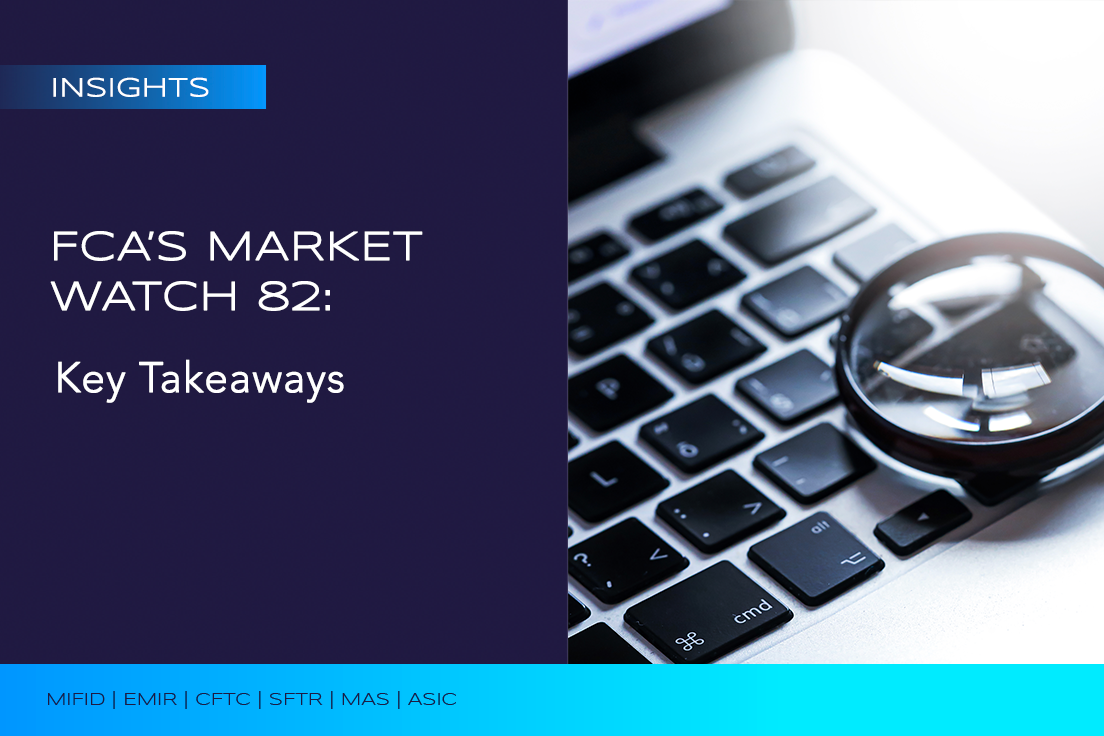FCA's Market Watch 82
Key Takeaways
 Author: Dan Fletcher
Author: Dan Fletcher
Transaction Reporting Manager
12 August 2025
The recent Market Watch 82 article highlights the FCA’s position on what could be described as post reporting processes, namely: i) remedial timelines, ii) back reporting of errors; iii) submission to the FCA of errors and omissions notifications. This follows on from the previous Market Watch article that covered data quality issues and the accompanying processes, demonstrating that the FCA will look at the whole process and it is therefore in your best interest to have everything in order from start to finish.
Remedial Timelines
The main takeaway here is that issues should be remediated quickly. Firms should also be as transparent and proactive as possible – you should be upfront and communicative with the regulator once you have identified that remedial work is required. Although, the FCA does leave open the door to some leeway by noting that they will assess the appropriateness of a remedial timeline on a case-by-case basis – particularly in complex cases.
Back Reporting of Errors
One of the underlying purposes of transaction reporting is to allow the FCA to monitor, detect, and investigate market abuse. Back reporting is required to amend errors in the initial transaction report submission. Therefore, the FCA argues that delays in submitting back reporting leave their data set inaccurate for longer and essentially makes their job more difficult.
In Market Watch 82, the FCA provides four common causes of delayed back reporting: i) crystallised compliance risk; ii) internal governance weakness; iii) data access and infrastructure limitations; iv) impact on Business As Usual (“BAU”). It appears the key takeaways from these case studies are as follows:
- Firms must ensure that they have effective compliance oversight.
- Firms must ensure that they have good internal governance, adopting a risk-based approach to the sequencing of both back reporting and BAU work – the most significant errors must be back reported first.
- Effective change management processes are a must have.
- Firms must allocate resources appropriately so that day-to-day transaction reporting is not unduly affected by any back-reporting exercise.
Errors and Omissions Notifications
The FCA has analysed the errors and omissions notifications received throughout Q1 2025 and provided their supervisory observations and suggested best practices, expanding on the detail they expect to see when a notification is made.
There is an emphasis on providing what information you have in the first instance in a structured format as soon as possible, then submitting additional or new information as it becomes available, rather than delaying the submission. The provision of sufficient levels of detail are also referenced, as is the avoidance of generic comments that are not specific to the issue at hand. In essence, make sure you have a good initial understanding of what has happened and the timelines it will take to resolve prior to reporting to the FCA – but ensure you do this as quickly as you can.
An important point is made at the bottom of the article. The FCA explicitly puts firms on notice that they, “… will continue to monitor the quality of breach notifications closely…” and that they have introduced a monitoring and evaluation of quality process to benchmark firms against each other. It is clear the FCA will assess the quality of your submission and will follow-up if it does not meet the requisite standard.
Conclusion
The FCA has provided notice to the market that they take the quality of a firm’s post reporting processes seriously. There is a certain level of information the FCA require and not providing this in good time will likely be treated as a black mark against your firm. In turn, this may reduce any leniency you receive from the FCA when carrying out your back reporting exercise. It is in your interest to be sufficiently detailed and timely – you have been warned!

